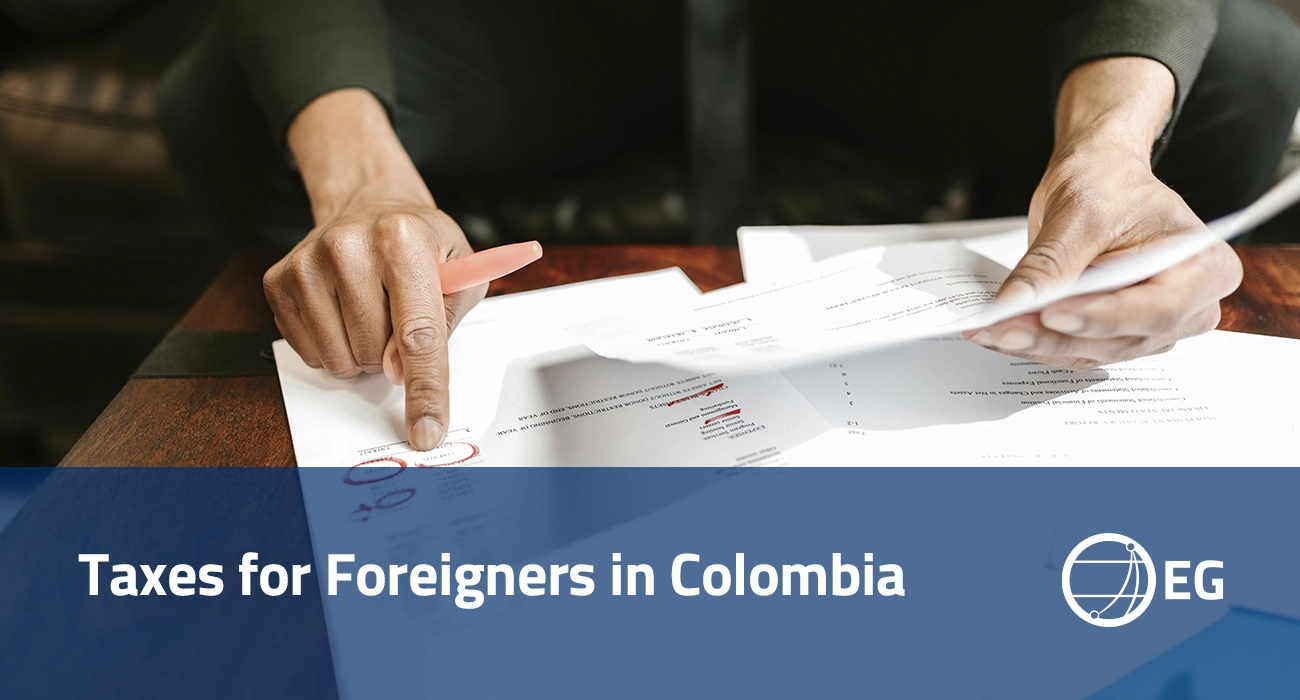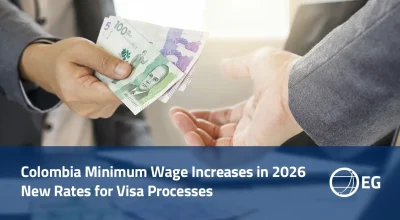Table of Contents
Do I have to pay taxes for foreigners when living in Colombia? That’s a prevalent question that many expats mention when considering relocating to Colombia.
However, it is no surprise that more and more foreigners are choosing Colombia not only as a tourist destination but also as a place to live permanently. With its warm hospitality, rich culture, diverse gastronomy, and breathtaking landscapes, Colombia offers an attractive lifestyle. Additionally, the exchange rate continues to be a financial advantage for foreigners with income from abroad, making the cost of living even more favorable for expatriates.
At expatgroup.co, we understand living in another country is a life-changing decision that involves various essential considerations, including culture, climate, language, and healthcare. Additionally, it is crucial to understand the legal and regulatory aspects, such as visa requirements and tax obligations for foreigners, to ensure compliance and a smooth transition knowing properly the taxes for foreigners you might face.
So, if you choose Colombia as your destination, it is essential to comply with current immigration and tax regulations. First, make sure to obtain a visa that aligns with your profile, activities, and plans—whether you intend to work, study, invest, start a business, or establish long-term residency in Colombia.
Second, it is essential to understand Colombia’s tax system as a natural person and comply with the tax regulations applicable to foreigners. While taxes may seem like a complex topic, they are a common concern among expats, and we frequently receive questions on this subject.
Below, we provide an overview of the key aspects of taxation in Colombia and answer some of the most frequently asked questions.
Glossary of terms for taxes in Colombia
When am I considered a tax resident in Colombia?
Natural persons are considered residents in Colombia for tax purposes if they meet any of the following conditions:
- Staying in Colombia continuously or intermittently for more than 183 calendar days within any 365-day period, including days of entry and exit, establishes tax residency.
- Exceptions apply to individuals registered in the Colombian diplomatic service or those related to them, who, under the Vienna Convention on Diplomatic Relations, are partially or fully exempt from income tax.
Get the RUT in Colombia for individuals
The RUT (Registro Único Tributario) is the DIAN's system for identifying and classifying individuals and entities in the tax system based on their economic activities, assets, and contributions. Click the button for professional assitance!
What taxes must I pay if I am a foreigner in Colombia?
A foreigner classified as a tax resident in Colombia is required to pay income tax on earnings from both national and foreign sources, as well as on assets held inside and outside the country (such as real estate, vehicles, and bank deposits).
However, this does not necessarily mean that a foreigner must declare all income earned outside Colombia, as there are double taxation treaties and tax credits available for taxes paid abroad, which we explain below.
Additionally, a foreigner considered a tax resident is subject to the same income tax declaration rules as Colombian nationals. Therefore, the applicable income thresholds must be taken into account to determine whether a tax return is required.
For example, if I am a foreign resident and earn rental income from my properties in Colombia exceeding $58,184,000 in 2024, I must declare income in the 2025 tax calendar established by the DIAN.
Additionally, as a Colombian tax resident, I am required to file an additional tax return called the “Declaration of Assets Held Abroad.” This is an informative tax return that records assets owned outside Colombia (such as shares in companies, investment portfolios, and real estate, among others). However, this declaration does not generate any tax obligation.
Failing to declare these assets can result in economic sanctions. This declaration is only required if the total value of assets held abroad exceeds a certain threshold as of January 1st of each year. For 2025, this threshold is $92,864,000.
What taxes do I have to pay if I am a foreigner and NOT a resident of Colombia?
If a foreigner is not classified as a tax resident (i.e., they stay in Colombia for up to 183 days within any 365-day period, either continuously or discontinuously), they are only required to declare and pay income tax on:
- Income from Colombian sources
- Inherited assets located in Colombia (e.g., real estate, vehicles, bank deposits)
This means that while they must pay taxes on income earned in Colombia, they are not taxed on income earned abroad. This is a key difference between being a tax resident and a non-tax resident.
However, non-resident foreigners must comply with the same income tax declaration rules as residents regarding the financial thresholds (UVT limits) established by the DIAN.
In other words, if you are a tourist in Colombia and your income, credit card spending, bank transactions, or total assets in Colombia exceed the 2025 thresholds, you will be required to file an income tax return—even if you are not a tax resident.
If a non-resident foreigner operates one or more permanent establishments or branches in Colombia—meaning they have a fixed place of business where they conduct part or all of their economic activity—they are required to file a tax declaration for each establishment or branch.
Example:
Dave, a digital nomad, visited Colombia as a tourist and decided to set up a coworking space to work from while renting out desks to other remote workers. Even though Dave is not a tax resident, the fact that he operates a permanent business in Colombia makes him liable to file income tax returns for his coworking space.
Do You Know How To File Your Income Tax In Colombia?
We will assign you a financial advisor to provide expert and bilingual assistance to comply with your Income Tax in Colombia.
Double taxation treaties
If the foreign source income originated in a country with which Colombia has a double taxation treaty, there is no tax to be paid on such foreign source income.
Still, if the foreigner complies with any of the tops or stays in Colombia to declare taxes or be considered a tax resident, they must file the income tax return even if it does not generate tax liability and, if applicable, their declaration of assets held abroad.
New wealth tax
According to Law 2277 of 2022, the wealth tax in Colombia must be declared by:
- Natural and legal persons, both national and foreign, who are residents in Colombia, as well as illiquid inheritances of individuals who have passed away without their assets being awarded to their heirs.
- Non-resident individuals, regarding assets owned directly or indirectly in Colombia, unless exceptions are established in international treaties or domestic legislation.
- Foreign companies or entities that are not income tax filers in Colombia and own assets in the country, excluding shares, accounts receivable, and portfolio investments. Entities that enter into financial leasing contracts with Colombian residents are exempt.
For the year 2025, the wealth tax applies to those with a net worth equal to or greater than 72,000 UVT, which is approximately COP 3.585 billion, considering that one UVT in 2025 is COP 49,799.
The applicable tax rates for the years 2023 to 2026 are progressive:
- Up to 72,000 UVT: 0%
- More than 72,000 up to 122,000 UVT: 0.5%
- More than 122,000 up to 239,000 UVT: 1.0%
- More than 239,000 UVT: 1.5%
Starting in 2027, the maximum tax rate will be reduced to 1.0% for net worth exceeding 122,000 UVT.
The deadline to file and pay the first installment of the wealth tax in 2025 is scheduled between May 12 and May 23, regardless of the taxpayer’s tax identification number (NIT). This tax aims to promote greater fiscal equity, ensuring that those with higher economic capacity contribute more significantly to public spending.
Other matters related to taxes in Colombia
When do I not have to file an income tax return?
A foreigner who is not a tax resident and meets the thresholds that require filing an income tax return is exempt from filing it if the withholding at source indicated in Articles 407 to 411 of the Colombian Tax Code (ET) has already been applied.
For instance, Sophia is a systems engineer. A major bank hired her to configure its security system. Her total fees amounted to $75,000,000 COP; however, the bank applied the respective withholding tax. Therefore, Sophia is not required to file an income tax return in Colombia.
What is the difference between paying and declaring income?
Filing an income tax return is different from paying taxes. You may be required to file a tax return if you meet the established criteria (thresholds); however, depending on individual circumstances, the return may not necessarily result in a balance to be paid.
What happens if I do not file an income tax return when I am obliged to do so?
If a person fails to file their income tax return when required, they may be subject to a financial penalty of up to 20% of the value of their bank deposits or gross income.
However, if the return is filed late—after the due date but before the tax authority imposes the penalty for non-filing—a financial penalty must still be calculated according to the applicable legal provisions.
It is important to note that any tax penalty cannot be lower than 10 UVT, which for 2025 is equivalent to $497,990 COP.
How expatgroup.co can help you
Navigating taxes as a foreigner in Colombia may initially seem overwhelming, but understanding the fundamental rules can save you from surprises. Whether you’re a resident or non-resident, staying informed about your tax obligations ensures compliance and helps you manage your finances effectively.
Our expert team is here to guide you in:
- Determining your tax residency status.
- Filing income tax returns correctly and on time.
- Understanding how double taxation treaties can work in your favor.
- Avoiding penalties for non-compliance.
Feel free to contact us for tailored advice that fits your unique situation. Living in Colombia should be about enjoying all it offers—not stressing about taxes.

Do you want to understand the Colombia Tax Regime?
Understanding Colombia’s Tax Regime is crucial for anyone living or working in the country. That’s why expatgroup.co has created a comprehensive guide to help you navigate the complexities of Colombian taxes with confidence. Visit our guide today and ensure you’re well-informed about your tax obligations.
Comments
Share your experience or question.
Your comment could inspire and help others who dream of living in Colombia.








7 Responses
Does Columbia tax income from goverment pensions that are from municipal sources e.g. City Of Los Angeles pension?
Hi Karen,
No, pensions are not taxable for foreign individuals in Colombia.
I found this, isn’t that right?
Starting in 2025, foreign pension income is tax-exempt up to 1,000 UVT per month (which equates to 47,212,000 COP annually, or approximately 11,800 USD with a tax rate of 4,000 COP.
Yes. Just as you quote, only if your monthly pension exceeds this limit, the excess may be subject to income tax in Colombia. If you have a specific case where you might need some expert advice, don’t hesitate to contact us through the following link:
🌐https://expatgroup.co/book-an-appointment/#legal-advice
Ola,
I will will be social security seconded from Spain by my Spanish employer , and I will owe income tax in Columbia, as confirmed by my Spanish tax advisor.
Do I need a columbian bank account to pay the Columbian tax or can I use my foreign bank account?
Thank you,
We recommend that you seek specialized and advanced advice from our tax experts, who can help guide you in making informed decisions. Apply now:
🌐https://expatgroup.co/book-an-appointment/#legal-advice
Ola,
I will will be social security seconded from Spain by my Spanish employer , and I will owe income tax in Columbia, as confirmed by my Spanish tax advisor.
Do I need a columbian bank account to pay the Columbian tax or can I use my foreign bank account?
Thank you,